I am in the enjoyable position of receiving copies of most of the latest and greatest Christian books, and, well, they just keep coming! In the last couple of weeks my mailbox has been very nearly flooded by books, many of which look just excellent. Here are a few of the highlights.
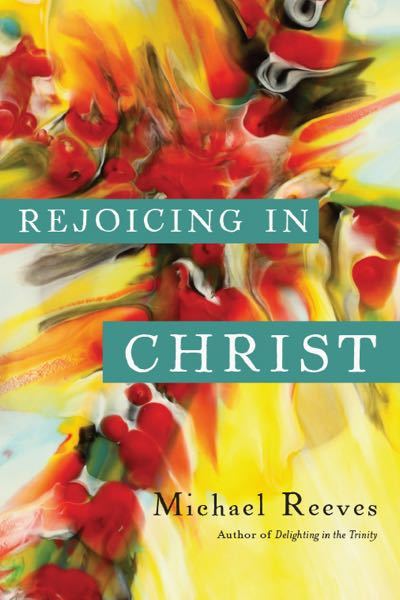 Rejoicing in Christ by Michael Reeves. I intend to give this one a read, simply because of how much I enjoyed Delighting in the Trinity. “If we want to know who God is, the best thing we can do is look at Christ. If we want to live the life to which God calls us, we look to Christ. In Jesus we see the true meaning of the love, power, wisdom, justice, peace, care and majesty of God. Michael Reeves, author of Delighting in the Trinity, opens to readers the glory and wonder of Christ, offering a bigger and more exciting picture than many have imagined. Jesus didn’t just bring us the good news. He is the good news. Reeves helps us celebrate who Christ is, his work on earth, his death and resurrection, his anticipated return and how we share in his life. This book, then, aims for something deeper than a new technique or a call to action. In an age that virtually compels us to look at ourselves, Michael Reeves calls us to look at Christ. As we focus our hearts on him, we see how he is our life, our righteousness, our holiness and our hope.” (Learn more or buy it at Amazon or Westminster Books)
Rejoicing in Christ by Michael Reeves. I intend to give this one a read, simply because of how much I enjoyed Delighting in the Trinity. “If we want to know who God is, the best thing we can do is look at Christ. If we want to live the life to which God calls us, we look to Christ. In Jesus we see the true meaning of the love, power, wisdom, justice, peace, care and majesty of God. Michael Reeves, author of Delighting in the Trinity, opens to readers the glory and wonder of Christ, offering a bigger and more exciting picture than many have imagined. Jesus didn’t just bring us the good news. He is the good news. Reeves helps us celebrate who Christ is, his work on earth, his death and resurrection, his anticipated return and how we share in his life. This book, then, aims for something deeper than a new technique or a call to action. In an age that virtually compels us to look at ourselves, Michael Reeves calls us to look at Christ. As we focus our hearts on him, we see how he is our life, our righteousness, our holiness and our hope.” (Learn more or buy it at Amazon or Westminster Books)
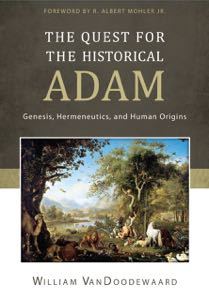 The Quest for the Historical Adam: Genesis, Hermeneutics, and Human Origins by William Vandoodewaard. Here’s a work by a trusted author on an awfully important subject. “Was Adam really a historical person, and can we trust the biblical story of human origins? Or is the story of Eden simply a metaphor, leaving scientists the job to correctly reconstruct the truth of how humanity began? Although the church currently faces these pressing questions exacerbated as they are by scientific and philosophical developments of our age we must not think that they are completely new. In The Quest for the Historical Adam, William VanDoodewaard recovers and assesses the teaching of those who have gone before us, providing a historical survey of Genesis commentary on human origins from the patristic era to the present. Reacquainting the reader with a long line of theologians, exegetes, and thinkers, VanDoodewaard traces the roots, development, and, at times, disappearance of hermeneutical approaches and exegetical insights relevant to discussions on human origins. This survey not only informs us of how we came to this point in the conversation but also equips us to recognize the significance of the various alternatives on human origins.” (Learn more or buy it at Amazon or Westminster Books)
The Quest for the Historical Adam: Genesis, Hermeneutics, and Human Origins by William Vandoodewaard. Here’s a work by a trusted author on an awfully important subject. “Was Adam really a historical person, and can we trust the biblical story of human origins? Or is the story of Eden simply a metaphor, leaving scientists the job to correctly reconstruct the truth of how humanity began? Although the church currently faces these pressing questions exacerbated as they are by scientific and philosophical developments of our age we must not think that they are completely new. In The Quest for the Historical Adam, William VanDoodewaard recovers and assesses the teaching of those who have gone before us, providing a historical survey of Genesis commentary on human origins from the patristic era to the present. Reacquainting the reader with a long line of theologians, exegetes, and thinkers, VanDoodewaard traces the roots, development, and, at times, disappearance of hermeneutical approaches and exegetical insights relevant to discussions on human origins. This survey not only informs us of how we came to this point in the conversation but also equips us to recognize the significance of the various alternatives on human origins.” (Learn more or buy it at Amazon or Westminster Books)
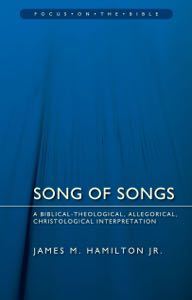 Song of Songs: A Biblical-Theological, Allegorical, Christological Interpretation by James Hamilton. I deeply respect both the author and the commentary series, so I suspect this must be a really good resource. “In the Song of Songs the son of David, King in Jerusalem, overcomes hostility and alienation to renew intimacy between himself and his Bride. This most sublime Song sings of a love sure as the seal of Yahweh, a flashing flame of fire many waters could never quench. James M. Hamilton Jr, in this latest addition to the popular Focus on the Bible series, pours fresh light on this inspiring and uplifting book.” (Learn more or buy it at Amazon or Westminster Books)
Song of Songs: A Biblical-Theological, Allegorical, Christological Interpretation by James Hamilton. I deeply respect both the author and the commentary series, so I suspect this must be a really good resource. “In the Song of Songs the son of David, King in Jerusalem, overcomes hostility and alienation to renew intimacy between himself and his Bride. This most sublime Song sings of a love sure as the seal of Yahweh, a flashing flame of fire many waters could never quench. James M. Hamilton Jr, in this latest addition to the popular Focus on the Bible series, pours fresh light on this inspiring and uplifting book.” (Learn more or buy it at Amazon or Westminster Books)
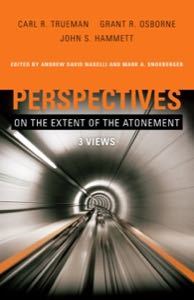 Perspectives on the Extent of the Atonement: 3 Views, edited by Andy Naselli & Mark Snoeberger. This is one of two new volumes in B&H’s “Perspectives” series. “Perspectives on the Extent of the Atonement presents a point-counterpoint exchange concerning God’s intention in sending Christ to die on the cross. All three contributors recognize a substitutionary element in the atoning work of Christ, but disagree over the nature and objects of that substitution. Carl Trueman (Westminster Theological Seminary) argues that Christ’s atoning work secured the redemption of his elect alone. While infinite in value, Christ’s death was intended for and applied strictly to those whom the Father had elected unconditionally in eternity past. John Hammett (Southeastern Baptist Theological Seminary) argues that Christ’s atoning work had multiple intentions. Of these intentions two rise to the fore: (1) the intention to accomplish atonement for God’s elect and (2) the intention to provide atonement for all mankind. Grant Osborne (Trinity Evangelical Divinity School) argues that Christ’s atoning work provided atonement generally for all mankind. The application of that atoning work is conditioned, however, on each person’s willingness to receive it.” (Learn more or buy it at Amazon or Westminster Books)
Perspectives on the Extent of the Atonement: 3 Views, edited by Andy Naselli & Mark Snoeberger. This is one of two new volumes in B&H’s “Perspectives” series. “Perspectives on the Extent of the Atonement presents a point-counterpoint exchange concerning God’s intention in sending Christ to die on the cross. All three contributors recognize a substitutionary element in the atoning work of Christ, but disagree over the nature and objects of that substitution. Carl Trueman (Westminster Theological Seminary) argues that Christ’s atoning work secured the redemption of his elect alone. While infinite in value, Christ’s death was intended for and applied strictly to those whom the Father had elected unconditionally in eternity past. John Hammett (Southeastern Baptist Theological Seminary) argues that Christ’s atoning work had multiple intentions. Of these intentions two rise to the fore: (1) the intention to accomplish atonement for God’s elect and (2) the intention to provide atonement for all mankind. Grant Osborne (Trinity Evangelical Divinity School) argues that Christ’s atoning work provided atonement generally for all mankind. The application of that atoning work is conditioned, however, on each person’s willingness to receive it.” (Learn more or buy it at Amazon or Westminster Books)
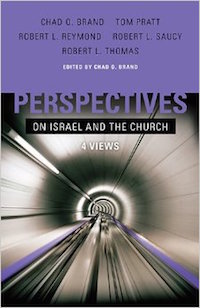 Perspectives on Israel and the Church: 4 Views, edited by Chad Brand. And here’s the second new volume in the “Perspectives” series. “The relationship between Israel and the church is one of the most debated issues in the history of theology. Some hold the view that there is almost seamless continuity between Israel and the church, while others believe there is very little continuity. Additional perspectives lie between these two. This debate has contributed to the formation of denominations and produced a variety of political views about the state of Israel. To advance the conversation, Perspectives on Israel and the Church brings together respected theologians representing four positions: Traditional covenantal view by Robert L. Reymond; Traditional dispensational view by Robert L. Thomas; Progressive dispensational view by Robert L. Saucy; Progressive covenantal view by Chad Brand and Tom Pratt Jr.” (Learn more or buy it at Amazon)
Perspectives on Israel and the Church: 4 Views, edited by Chad Brand. And here’s the second new volume in the “Perspectives” series. “The relationship between Israel and the church is one of the most debated issues in the history of theology. Some hold the view that there is almost seamless continuity between Israel and the church, while others believe there is very little continuity. Additional perspectives lie between these two. This debate has contributed to the formation of denominations and produced a variety of political views about the state of Israel. To advance the conversation, Perspectives on Israel and the Church brings together respected theologians representing four positions: Traditional covenantal view by Robert L. Reymond; Traditional dispensational view by Robert L. Thomas; Progressive dispensational view by Robert L. Saucy; Progressive covenantal view by Chad Brand and Tom Pratt Jr.” (Learn more or buy it at Amazon)
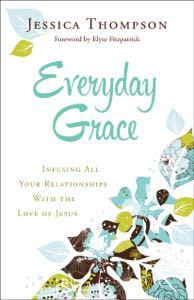 Everyday Grace: Infusing All Your Relationships with the Love of Jesus by Jessica Thompson. “It’s hard, sometimes, to get over that thing your husband said weeks ago; or to resolve that tension with your colleague at work; or to fix a lifelong friendship that’s taken a bad turn. The biggest problem with relationships is they always seem to involve sinners–including ourselves. So how can we form strong, resilient bonds with people who, like us, are bound to mess up? Thankfully, it’s not all on us. Through stories and biblical teaching, Jessica Thompson helps us move beyond trying to “fix” the people we interact with, and shows us a better way. Though our relationships may be marred by tension and frustration, because we are welcomed and known by Christ, they don’t have to stay that way.” (Learn more or buy it at Amazon or Westminster Books)
Everyday Grace: Infusing All Your Relationships with the Love of Jesus by Jessica Thompson. “It’s hard, sometimes, to get over that thing your husband said weeks ago; or to resolve that tension with your colleague at work; or to fix a lifelong friendship that’s taken a bad turn. The biggest problem with relationships is they always seem to involve sinners–including ourselves. So how can we form strong, resilient bonds with people who, like us, are bound to mess up? Thankfully, it’s not all on us. Through stories and biblical teaching, Jessica Thompson helps us move beyond trying to “fix” the people we interact with, and shows us a better way. Though our relationships may be marred by tension and frustration, because we are welcomed and known by Christ, they don’t have to stay that way.” (Learn more or buy it at Amazon or Westminster Books)










